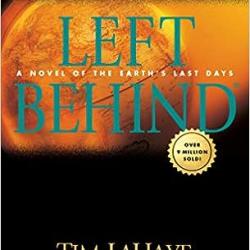Conspiracies and Faith: Did Jesus Really Exist?
What is in Area 51? Did Oswald work alone? Was there a moon landing or was the footage filmed on a set somewhere? Is Elvis alive? Did he fake his death? Did the aliens build the Gaza Pyramids? No doubt you can add several conspiracies to the list. Watching late-night TV while fighting insomnia, you can find yourself engrossed in all kinds of conspiracies, usually involving aliens. Add in grainy pictures and eerie music and you can enjoy goosebumps on your arms for hours. Throw in buttered popcorn, a pint of chocolate ice cream, a warm blanket, a 2-liter Coke, and your favorite fuzzy slippers, and you have entertainment for hours. Conspiracies are usually harmless fun, but a conspiracy theory about Jesus has gotten significant traction and there is nothing harmless about it.
Normally, I do not ponder conspiracies for long. Conspiracies depend on secrets, and I am inclined to believe Ben Franklin, “Two people can keep a secret if one of them is dead.” They also run their course quickly and are usually not worth the effort required to rebut them. This conspiracy theory, however, needs to be exposed as the fraud it is.
Did Jesus Exist?
There are several versions of the theory, but they converge on one point: Jesus never existed. A version of the conspiracy goes like this: Emperor Constantine invented Jesus to unify Rome under one religion. Another version of the theory is that authors compiled the stories of Jesus from other active religions in the Ancient Near East in the time frame of Second Temple Judaism. Christianity is a collection of myths with no more truth to it than the Twilight series, they argue. Still another version is that Romans invented the Gospels to occupy the Jews and keep them from being problems for the Roman authorities.
Why the Ancient Christian Record About Jesus Is the Most Reliable
What Evidence is there for Jesus?
The first bit of evidence conspiracy theorists cite is the lack of outside sources about Jesus. Yes, most sources about Jesus are from those who believe in Him, and there are no written sources about Jesus for years after His life. What these skeptics miss, however, is that an absence of written documentation about Jesus from outside sources is exactly what one would expect.
Judaism was a small religion living on the outskirts of the Roman Empire. A typical Roman would have thought of Jerusalem, not as the center of the religious world or a great holy city. He would have thought of it as the backwater of the Empire. For the Romans, Jews were not the first recipients of the Word of God; they were an aggravation. They were a riot, a revolt, awaiting an opportunity. Romans only cared about the Jews because they were a problem. So, Christianity emerged as a minority group in Judaism on the edge of the Roman Empire. Of course, there would be little or no Roman documentation of Jesus’ life.
Are the Gospels Historically Accurate Documents?
The conspiracy theorists argue the Gospel records about Jesus are falsified histories, fake news. The problem with that, of course, is that the Gospels are historically very credible. There are four Gospels, and they are not exactly alike. If all we had were the Synoptic Gospels,[1] we would conclude that Jesus’ ministry lasted 1 year. It is from John that we learn Jesus’ ministry was 3 years.
Calling that difference a contradiction is not credible, though. The Synoptics do not rule out a longer ministry. There are plenty of places, in Luke particularly, where the date is not relevant to the narrative. In Luke 5, for example, Luke uses the phrase “one day” 2 times. The days are not even presented as sequential. They are just different events in the life of Jesus on two different days. How many days were between the events? It cannot be known because Luke does not tell us.
The History of the Birth of Jesus
There is one historical problem with Luke, though. In Luke 2:2, the beginning of the Christmas story, Luke recounts Caesar Augusts ordering a census, taxing in the King James, when Quirinus was Governor of Syria. There is no extra-Biblical confirmation of such a that census. Not having that evidence is not discrediting to Luke, however. The absence of evidence is not evidence of absence. Needless to say, though, discerning the date of Jesus’ birth by comparing what Luke tells us and what available historical records show is difficult.
In looking at the text and the historical documents, Many modern Biblical scholars have suggested that the phrase, “…first made when…” should be translated, “…before the one made when…” This reading would fit with the historical data as we have it and the Greek text. If this reading is correct, however, remains the subject of continued research.
Luke Was Not a Novelist
The problem of dating Jesus’ birth, however, is not evidence that Luke is inventing a story. Luke is a faithful interpreter of the historical records available to him. I would argue that Luke has better access to the historical record of his time than we do 2,000 years later. If there is a discrepancy between what Luke says and what modern research has access to, I will choose Luke. At every other point in his narrative, Luke has proven himself to be a faithful and accurate historian.
It is also essential to note a detail in Luke 1:3. There, Luke tells the reader that he has consulted eyewitnesses to create an orderly account. This detail is important because if Luke had falsified the record, the eyewitnesses would have been there to discredit him. The idea that Luke is a novelist rather than a historian compiling a historical document is absurd.
John is Different
John’s Gospel is different, and the way modern people read texts could lead to some confusion with John. While moderns write and think chronologically, John is not writing a chronological account of the ministry of Jesus. In his Gospel, John writes topically. One classic example of John’s writing style is the story of the cleansing of the Temple. The Synoptics list the event as part of Holy Week, but John puts it at the beginning of the Gospel.[2]
One other note, John was an eyewitness to the events of Jesus, and his Gospel is full of small details that an eyewitness would report. The first-hand nature of The Gospel of John simply contradicts modern conspiracy theories about Jesus.
The Gospels are Credible
The Gospels are good history, very good history. They are much better historical documents than other historical documents of their era. It is only when one uses categories of reading that are foreign to the Gospels that one can make the Gospels look false. Even that takes extraordinary effort. The events the Gospels point to are real events, witnessed by real people.
What About Paul?
If one, for whatever reason, wanted to discredit the Gospels and conclude they are not evidence for a real person named Jesus, there is still Paul’s work that must be examined. Paul’s first letter, historians suggest, was written in the mid-50s, just 20 years after the events of Jesus’ life. The letters include hymns about Jesus, traditions about Jesus, and loose paraphrases about the Last Supper. None of these items could have been fabricated about Jesus in time for Paul to use them in his letters. It is not plausible.
The Early Church
Christianity was a well-developed religion before the end of the first century. Pope Clement 1 was bishop of Rome by 88. The Romans Martyred Polycarp, a disciple of John, in 155. Ignatius of Antioch, also a disciple of John, died either in the late first century or early second century. In 96, Clement wrote the first of his letters to the Church in Corinth. By way of comparison, most scholars believe John penned the Revelation at the end of Nero’s reign or during Domitian’s reign either in 64-68 or 95-96, and most scholars prefer the later date.[3] The Letters of Clement are contemporaneous with Revelation.
Is It Possible?
If Jesus never existed, the legends about Him emerged at the time He was purported to live, in the right area, with the right history. Further, worship of Jesus emerged very early. Before Paul wrote his first letters, hymns and traditions emerged. The worship of Jesus as divine emerged before 50 AD. The conspiracy theory that Constantine invented Christianity is simply laughable as are other theories arguing that Jesus never existed.
A great Christian thinker, William of Ockham, formulated Ockham’s Razor. Ockham’s Razor argues the simplest explanation is usually the right one. Applying the theory we look at the two theories.
Theory 1: Unknown authors created a myth out of existing material that became popular very quickly, leading to people worshipping the myth’s main character and being willing to die for it. Further, those who could have falsified the myth were still living and remained silent. This theory must also hold that the creators of the myth received no benefit from it.
Theory 2 is that the Gospels are a historically verifiable set of documents about the life of a real person named Jesus of Nazareth.
Which theory makes more sense?
[1] Synoptic is from the Greek meaning “see together.” One could say that they are “look-alike” Gospels.
[2] Many argue there were two cleansings of the Temple, one at the beginning and one at the end of Jesus’ ministry. While certainty is not possible, I think the most likely reading is that John puts the most controversial moment of Jesus’ ministry first. As I understand Jesus’ ministry, the single most likely reason the leaders wanted to kill Jesus was the cleansing of the Temple.
[3] Kistemaker, Simon J., Revelation (Grand Rapids, MI: Baker Books, a division of Baker Publishing Group, 2001), 26.













